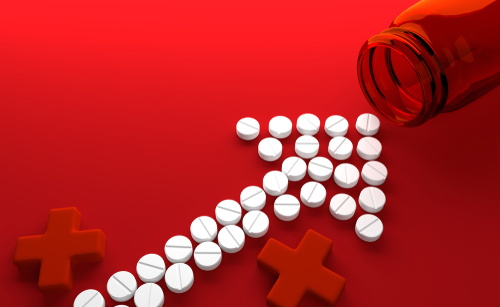After positive feedback from the U.S. Food and Drug Administration, TG Therapeutics is planning to pursue accelerated approval for umbralisib (TGR-1202) as a treatment for patients with marginal zone lymphoma (MZL).
The decision was supported by findings from the ongoing UNITY-NHL Phase 2b clinical trial (NCT02793583), in which more than half of patients responded to umbralisib, and 88% had some sort of benefit from the treatment.
The company anticipates initiating a new drug application (NDA) submission for patients with previously treated marginal zone lymphoma by the end of 2019.
“Defining a path to a regulatory submission for umbralisib for this patient population marks an important step forward for the company and we appreciate the guidance we have received from the FDA,” Michael S. Weiss, executive chairman and CEO of TG Therapeutics, said in a press release.
“As a non-chemotherapy, orally active, once daily medication, we believe umbralisib could represent a meaningful new treatment option for patients with MZL,” Weiss said.
Earlier findings from this trial already have led the FDA to grant the designation of breakthrough therapy to umbralisib for treating adults with marginal zone lymphoma who did not respond to at least one CD20 inhibitor.
Marginal zone lymphoma is a low-grade (cancer cells that look like normal cells) form of non-Hodgkin’s lymphoma responsible for approximately 6% of all lymphoma cases. Despite being treatable, many patients eventually relapse, at which point very few therapy options remain.
Umbralisib is a new-generation inhibitor of PI3K delta, a family of proteins that play important roles in the overgrowth and survival of immune B-cells, which are implicated in different types of lymphoma, including marginal zone lymphoma.
The safety and effectiveness of the investigational therapy, either alone or in combination with other therapies, is being evaluated in the ongoing UNITY-NHL trial in patients with relapsed or refractory non-Hodgkin’s lymphoma.
The trial is expected to enroll approximately 900 participants who will be randomized into one of three groups: umbralisib alone; umbralisib in combination with ublituximab (an anti-CD20 antibody under development by the company); or umbralisib plus ublituximab and the chemotherapy bendamustine.
UNITY-NHL enrolled a total of 69 patients with marginal zone lymphoma who failed to respond to a prior treatment with a CD20 targeted therapy.
Preliminary efficacy data from the first 42 evaluable patients, followed for a median time of 10.1 months, showed that 88% benefited from treatment with umbralisib alone.
Overall response rate was 57%, 42%, and 43% for the three MZL subtypes — extranodal, nodal, and splenic.
In addition, 86% of patients experienced some sort of reduction in tumor burden, with a median time to initial response of 2.7 months.
The treatment was well-tolerated overall, with six patients requiring dose reductions due to adverse side effects, and 10 patients discontinuing due to side effects deemed possibly related to treatment.
“Durable responses were observed, and toxicity did not appear to worsen with prolonged exposure,” researchers wrote.
Although the study already has met the company’s target goal of 40–50% response rate, the final analysis will be conducted when all treated patients have completed approximately nine months of follow-up.
The company is now planning Phase 3 studies for umbralisib in patients with marginal zone lymphoma and other indolent non-Hodgkin’s lymphoma subtypes.


